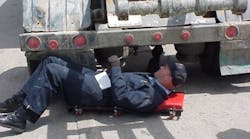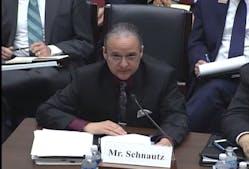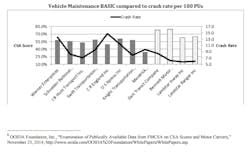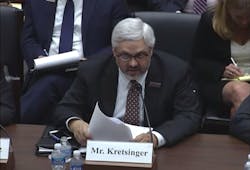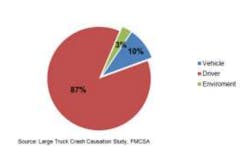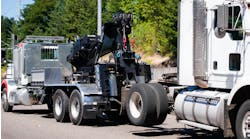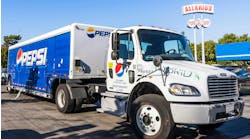Trucking industry representatives looking for a friendly venue where they might vent their frustrations with federal regulators found one Wednesday in the hearing room of the House Transportation committee.
There members of the subcommittee on highways received testimony on behalf of carriers large and small, from the motorcoach industry and even from regulatory enforcement, each with its own set complaints about the way the Federal Motor Carrier Safety Administration has strayed from its safety mission and initiatives that delivered results to become an agency focused on niggling details that have little to do with crash prevention.
The hearing was formally titled “The Future of Commercial Motor Vehicle Safety: Technology, Safety Initiatives, and the Role of Federal Regulation,” but Rep. Sam Graves (R-MO), the highways chairman, outlined the goal more simply: He called for “common-sense reforms to the regulatory process,” and he outlined concerns with “the growing scope and number of new regulations being placed on the industry.”
Likewise, Rep. Peter DeFazio (D-OR), ranking member of the Transportation committee, recalled his time as chair of the subcommittee, noting he had “delved deeply” into highway and truck safety over the years and he rattled off a long list of hearing subjects, including CSA, truck size and weight and cross-border trucking with Mexico.
“And it’s all, unfortunately, still very much a work in progress,” DeFazio said.
He pointed out that FMCSA has undertaken 41 regulatory changes that have resulted in “lots of activity” yet “less clarity for the industry.”
DeFazio called for solutions that allow flexibility and let drivers do their jobs more efficiently, and for reforms that consider safety “holistically,” meaning an “on the ground” look at the pressures on the trucking industry.
Indeed, FMCSA regulations and enforcement have set “a standard of perfection … that’s not real world,” said Danny Schnautz, operations manager for Clark Freight Lines, in testimony on behalf of the Owner-Operator Independent Drivers Assn. (OOIDA).
“This hearing comes at a critical time for the future of commercial motor vehicle safety policy,” Schnautz testified. “Instead of a reasoned or understanding approach to highway safety by addressing the key factors behind at-fault truck crashes, FMCSA policy on enforcement is driven by a goal of absolute compliance with the letter of every single regulation, no matter the connection to crashes.”
Schnautz criticized the Compliance, Safety, Accountability program for “inaccurately painting safe, small carriers as unsafe,” which costs them business and exposes them to heightened enforcement scrutiny—while larger, “truly unsafe” carriers are ignored.
Additionally, he explained, the focus on compliance means that carriers must spend valuable time training drivers “on the completion of a form” rather than on safe driving techniques.
“OOIDA’s greatest concern is that FMCSA’s approach will force many of the safest drivers and carriers out of the industry because it inhibits them from being successful small business owners,” Schnautz said. “These are small business truckers with every incentive to operate safely.”
He also noted FMCSA’s current focus on expensive technology initiatives puts additional pressure on owner-operators.
“Technology is not a substitute for skilled, professional drivers,” Schnautz said.
ATA calls for 'gold standard'
The head of a large trucking company also emphasized the importance of drivers, and supported the suggestion that resources are being misused if the focus on compliance distracts truckers from the practices that truly impact safety.
“Many of the things that happen in the scale house don’t cause wrecks,” said Tom Kretsinger, president and CEO of American Central Transport.
Specifically, Kretsinger’s testimony on behalf of American Trucking Assns. (ATA) cited data that highlights the role of the driver in 87% of truck crashes and adds that addressing driver behavior and truck safety falls into three broad categories “rules, enforcement and a partnership to promote voluntary initiatives.”
In looking at rules, Kretsinger mentioned ATA’s support for an electronic logging device mandate, electronic stability control and mandatory speed limiters for large trucks set no higher than 65 miles per hour, among several proposals.
On enforcement, he urged FMCSA to encourage more traffic enforcement coupled with a limited inspection, citing FMCSA data indicating that this highway enforcement approach is “at least four times more effective at preventing crashes and saving lives” than vehicle-based roadside inspections.
Finally, Kretsinger proposed FMCSA should partner with the trucking industry to develop a carrot approach in lieu of using only the “stick.” Kretsinger’s recommending a new partnership to “establish criteria for meeting a ‘Gold Standard’ and reward fleets that meet it,” adding that ATA supports the agency’s request for comment on such a program, dubbed “Beyond Compliance,” issued last week.
“These technologies are tools that cost money, that are voluntary. It’s good business and the right thing to do,”Similarly, Capt. Bill Reese of the Idaho State Police, on behalf of the Commercial Vehicle Safety Alliance, called for more flexibility from FMCSA in how states are allowed to use funds under the Motor Carrier Safety Assistance Program, through which federal dollars are allocated for enforcement programs. CVSA called for streamlining the grant process and reducing paperwork, enabling states “to spend more time and resources on doing the work of their program rather than administering it.”
The problem is that FMCSA has lost touch with the industries it oversees, explained Brian Scott, president of Escot Bus Lines LLC, on behalf of the United Motorcoach Assn.
“It’s a hostile environment,” Scott said. “There was a time when FMCSA would work with the industry—and those days are long gone.”
